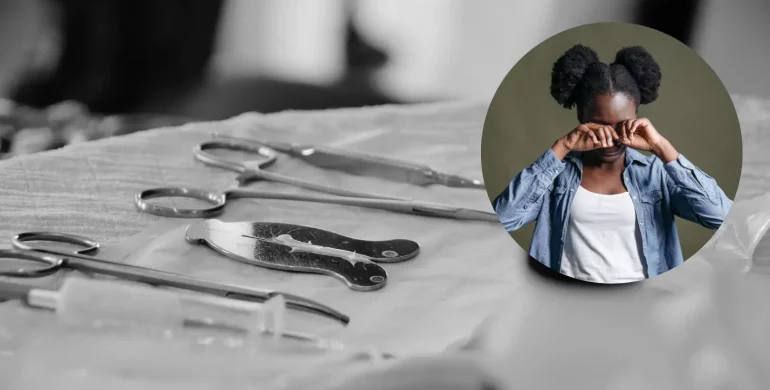In a world where the Human Rights of every person is prioritized above every other thing, the practice of Female Genital Mutilation still seems prevalent in most rural countries and communities all across different continents in the world.
Female Genital Mutilation (FGM) is the partial or complete removal of the female external genitalia otherwise known as the vulva. Some are of the opinion that this evil act is a way to help promote sexual purity among the female gender and help them keep themselves until marriage. It is believed that the practice of Female Genital Mutilation is a way for young girls and woman to hone their sexual urges.
Regardless of whatever opinion they may have, let us not forget that this inhumane act has caused more harm than good for many young girls and women across the universe. According to a report by CNN, more than 200 million girls and women have been subjected to the cutting and removal of their female genitalia. This practice is found in some African countries Nigeria included, Asia and the Middle East.
There are diverse reasons why Female Genital Mutilation (FGM) is still being practiced in most communities. Using Nigeria as a case study, one of the major reasons given for the practice of Female Genital Mutilation (FGM) is culture and tradition. FGM is often considered a necessary part of raising a girl, and a way to prepare her for adulthood and marriage. This can include controlling her sexuality to promote premarital virginity and marital fidelity.
Although no religion has the practice of Female Genital Mutilation (FGM) documented in their religious texts, most communities who practice this act believes or sees it as a rite of passage to womanhood to uphold the cultural belief and tradition of such communities. Young girls and women are made to undergo this evil and dangerous practice with no medical personnel and health precautions taken. This practice has zero health benefits and young girls and women are mutilated in unhygienic places with tools which are not often sterilized which can cause different diseases and ailments.
Nigeria alone has recorded an average number of 25% and 17% of this practice among females between the ages of 15-49 and 0-14 respectively. 3 out of 4 girls experience FGM before age 1. Worldwide, more than 3 million girls are estimated to be at risk every year of being subjected to the procedure, even though the practice is banned in 42 countries, including 24 nations in Africa.
Section 1 of the Female Genital Mutilation (FGM) act 2003 states that it is a criminal offence to “excise, infibulate or otherwise mutilate the whole or any part of a girl’s labia majora, labia minora or clitoris”. An estimate of 67% of girls and women think that this practice must be stopped.
Female Genital Mutilation violates the human right of every female child and woman which is why the government of Nigeria has recognized FGM as a discriminatory practice requiring policy and legal interventions since 2002, when it developed its first National FGM Policy. It enacted the Violence Against Persons Prohibition Act in 2015. Section 34 of the 1999 Nigeria constitution as amended states that “No person shall be subjected to any form of torture, inhuman and degrading treatment or punishment”. Also, section 11(B) of The Child rights act states that “no child shall be subjected to any form of torture, inhuman and degrading treatment or punishment”.
It is worth noting that the enforcement of section 11(B) of The Child Rights Acts is only applicable in 23 states with the Federal Capital Territory (FCT) inclusive this shows a deficiency in the enforcement of the law to protect girls and women against Female Genital Mutilation in other states of the country Nigeria.
According to an article by UNICEF about the elimination of FGM in Nigeria, it shows that since 2018, about 7 cases and arrests have been made regarding the violation of the rights of young girls and women by the practice of Female Genital Mutilation but there have been ZERO convictions of these cases which proves that the rights of the victims have not been fought for and there is no adequate process for the conviction and punishment of those guilty of this act.
This fight is to protect young girls and women and sensitize various communities who still believes in the practice of Genital Mutilation about the consequences and harm faced by victims both physically, mentally and emotionally
Together we can create a safe haven for women by stopping this bizarre practice.


